Month: November 2022
Walkers in the City
November 27, 2022
By: Robert Sullivan
from The New York Times
At the outset of the Covid-19 lockdown, Michael Kimmelman, the New York Times architecture critic, invited various architects, urban planners, writers and other experts to suggest walking tours of New York City, hoping that the itineraries would offer “examples of how the city remains beautiful, inspiring, uplifting.” Within days, the first account of what would ultimately be 17 walks was published, a conversation between a critic and a thinker, set within a particular area of the city. Now those walks, plus three more, have been assembled into a collection, “The Intimate City,” each chapter a geographic memoir: streetscape-jogged annotations on history, infrastructure, planning and combinations thereof, complemented by photos, many from the original series. “I was on the lookout,” Kimmelman says in his introduction, “for stories, both intimate and about the city, that I thought seasoned, savvy New Yorkers might find surprising — tidbits of history, law, technology or gossip I hadn’t heard myself, or that revealed something about the people who were telling the stories.”
… Kimmelman’s own recollections of growing up in Greenwich Village dovetail with the historical insights of Andrew Dolkart, an architectural historian and the co-founder of the NYC LGBT Historic Sites Project, which aims to increase public awareness of local sites important to L.G.B.T.Q. history. When activists applied to have the Stonewall Inn listed on the National Register, Dolkart reports, they sought the designation for adjoining streets — which also figured in the 1969 uprising for L.G.B.T.Q. rights — at the same time, and were advised to follow guidelines for registering Civil War battlefields.
Brooklyn Gets First LGBTQ+ Landmark With Designation of Lesbian Herstory Archives
November 22, 2022
By: Anna Bradley-Smith
from Brownstoner
Commissioners on the city’s Landmark Preservation Commission unanimously voted to landmark the Park Slope headquarters of the Lesbian Herstory Archives in a public meeting today.
The vote followed an October 25 public hearing where six people testified in support of landmarking the building at 484 14th Street due to its cultural significance. “Most lesbians don’t inherit queer culture from our parents, the Lesbian Herstory archives is our birthright and it’s the place where we can go to learn our own history,” LHA coordinating committee member Colette Denali Montoya-Sloan told commissioners at the hearing.
In a press release, project manager of the NYC LGBT Historic Sites Project Amanda Davis said the group was thrilled the women-owned building was now officially recognized as a New York City landmark, “further solidifying the importance of including LGBTQ history in the broader narrative of American history.”
“The designation — the first for an LGBTQ site in Brooklyn — acknowledges the pioneering lesbian women who, nearly 50 years ago, came together to create an affirming space for their community. Perhaps most significantly, these women reclaimed their past by saving and preserving lesbian-related records, photographs and ephemera for future generations of queer women,” Davis said.
Read the original story at Brownstoner.
Featured thumbnail by Susan De Vries.
WATCH: NYC LGBT Historic Sites Project Receives Prestigious Trustees’ Award from the National Trust for Historic Preservation
November 5, 2022
 The NYC LGBT Historic Sites Project is thrilled and honored to share that our work to identify and document NYC’s place-based LGBT history was honored by the National Trust for Historic Preservation Friday, November 4th, with their Trustees’ Award for Organizational Excellence, one of our field’s highest honors. The award was given at the PastForward Conference, in a ceremony hosted by old house icon Bob Vila.
The NYC LGBT Historic Sites Project is thrilled and honored to share that our work to identify and document NYC’s place-based LGBT history was honored by the National Trust for Historic Preservation Friday, November 4th, with their Trustees’ Award for Organizational Excellence, one of our field’s highest honors. The award was given at the PastForward Conference, in a ceremony hosted by old house icon Bob Vila.
“Each year at the PastForward Conference we come together to recognize those making a real difference in historic preservation. This year’s recipients embody not just the preservation of American history, but also demonstrate how preserving historic places can play a key role in addressing critical issues of today, including climate change, equality, and housing.” — Paul Edmondson, president and CEO of the National Trust for Historic Preservation
Since its founding in 2015, the Project has now identified, researched and mapped over 400 sites across New York City’s five boroughs which connect the public viscerally to the places — residences, bars and venues, public spaces, and more — where LGBT people have contributed to American culture.
About the Trust’s selection of the Project for the 2022 Trustees’ Award for Organizational Excellence: The NYC LGBT Historic Sites Project is a nationally-recognized and influential cultural heritage initiative and educational resource that identifies and documents diverse extant LGBT sites from the 17th century to 2000. The only permanent organization of its kind in the US, the project staff have created an interactive website, National Register nominations, publications and public programs, and school educational materials, among other resources. Sitting at the intersection of historic preservation and social justice, the organization has been particularly eager to document LGBT sites associated with women and Black, Asian, Latinx, trans, and gender-variant communities. In the near future, they hope to prioritize local sites of LGBT history associated with Indigenous and Two Spirit Peoples.
Landmarks Holds Public Hearing for Julius’ Bar
November 21, 2022
By: Cassidy Strong
from CityLand
Located at the corner of West 10th Street and Waverly Place, Julius’ holds great significance in NYC’s LGBTQ+ history and is undergoing Individual Landmark consideration. On November 15, 2022, the Landmarks Preservation Commission held a public hearing to discuss landmarking Julius’ Bar, located at 159 West 10th Street in Manhattan. The building was previously calendared for Individual Landmark consideration on September 13.
The public hearing began with a presentation from Kate Lemos McHale, Landmarks’ Director of Research. McHale described Julius’ Bar as “New York City’s most significant site of pre-Stonewall LGBTQ activism.” In 1966, three years before the Stonewall Rebellion, four activists with the Mattachine Society held a “Sip-In” at Julius’ Bar to protest the closure of restaurants and bars serving queer people. Modeling this direct action after the Civil Rights Movement, the Sip-In showcased the frustration and bold ideas of NYC’s gay community years before the Gay Liberation Movement.
Andrew Dolkart, a historic preservation professor, spoke next on behalf of the NYC LGBT Historic Sites Project. Dolkart shared that the Project “strongly supports” landmarking Julius’ Bar, which is often the last stop on their walking tours of queer historic sites, and that their research led to Julius’ being listed on the National Register of Historic Places in 2016.
Read the full story from CityLand.
Featured thumbnail via CityLand
Greenwich Village, Storied Home of Bohemia and Gay History
November 21, 2022
By: Michael Kimmelman
from The New York Times
The architectural historian Andrew Dolkart leads a walk past landmarks like the Stonewall Inn, Julius’ bar and the home of Lorraine Hansberry; excerpted from Kimmelman’s new book, “The Intimate City: Walking New York.”
Testimony in Support of the Proposed Designation of the Julius’ Bar Building as a New York City Landmark
November 11, 2022
To be presented by Project co-director, Andrew Dolkart, at the NYC Landmarks Preservation Committee public hearing on Tuesday, November 15, 2021.
My name is Andrew Dolkart, and I am one of the co-directors of the NYC LGBT Historic Sites Project, a cultural heritage initiative founded by historic preservationists in 2015 to document historic places connected to the lesbian, gay, bisexual, and transgender community in the city’s five boroughs.
The Project strongly supports the designation of the Julius’ Bar Building as a New York City Landmark. In the early 1990s, my co-directors, Jay Shockley and Ken Lustbader, and I were part of the Organization of Lesbian and Gay Architects + Designers (OLGAD), a pioneering group that advocated for LGBT historic sites at a time when the field of historic preservation paid little attention to sites of cultural significance, let alone ones connected to the LGBT community. In 1994, OLGAD created what we believe is the first map in the country to document LGBT historic places, and the building that houses Julius’ was included in this effort.
In 2015, when the NYC LGBT Historic Sites Project formed, one of our first priorities was to continue what OLGAD began more than twenty years earlier. We took the initiative to undertake the necessary research and write the text for the nomination of Julius’ to the National Register of Historic Places, which was approved in April 2016, one day before the 50th anniversary of the so-called “Sip In”.
Julius’ is located just a few minutes’ walk from the more famous Stonewall Inn, but its place in LGBT history is just as significant. The events at Stonewall in June 1969 did not exist in a vacuum. In the decades leading up to that uprising, bars were one of the few places that LGBT people could gather openly. Yet, at the same time, there were always inherent risks since the mere presence of a homosexual in a bar was considered to be disorderly: frequent police raids and other forms of entrapment could lead to arrest, loss of employment, and physical and mental abuse, among other threats. With photographers in tow, the game-changing public action by the Mattachine Society on April 21, 1966, which culminated at Julius’, was the earliest planned effort to capture LGBT discrimination in real time.
When we give walking tours in the area, we typically end at Julius’, and young people, in particular, are often surprised to learn that at one time, even in New York City, even in Greenwich Village, LGBT people faced these hardships in bars, of all places. Julius’ is therefore not only a great place to gather and have drinks with friends, but also a valuable teaching tool.
We thank Helen Buford, the owner of Julius’, for her incredible stewardship of the bar and its history, and for collaborating with and supporting our Project from the very beginning. The NYC LGBT Historic Sites Project proudly supports this proposed designation.
Thank you.
Landmarks Holds Public Hearing for Lesbian Herstory Archives
November 9, 2022
By: Cassidy Strong
from City Land
On October 25, 2022, the Landmarks Preservation Commission held a public hearing to discuss landmarking the Lesbian Herstory Archives in Park Slope, Brooklyn. Located at 484 14th Street within the Park Slope Historic District, the building was previously calendared for Individual Landmark consideration on June 28.
[Amanda Davis, Project Manager of the NYC LGBT Historic Sites Project] stated that the project “strongly supports the designation of the Lesbian Herstory Archives as a New York City Landmark,” pointing out that it would be the first LGBT site to be landmarked in Brooklyn. Davis also shared that when the project first launched its website with an initial 100 sites, the Lesbian Herstory Archives was included, and that the Archives’ resources have been “invaluable” to the project’s work. Since the Archives were created out of a lack of lesbian visibility, and Park Slope as a neighborhood is home to a large lesbian community, Davis affirmed that the project “proudly supports the proposed designation.”
Read the full story from CityLand.
Featured thumbnail via the LPC.
Plaque Unveiling at Caffe Cino, on Joe Cino’s 91st Birthday
November 17, 2022
The following remarks were presented by Amanda Davis, NYC LGBT Historic Sites Project manager, at the November 16, 2022 unveiling of the plaque at the former Caffe Cino, celebrating the building on the National Register of Historic Places.
Thank you to everyone who has come out today to celebrate the Caffe Cino, which Joe Cino opened nearly 65 years ago here at 31 Cornelia Street. I’d like to thank David Wilder and the staff of Bombay Bistro for collaborating with us today on this plaque unveiling and to the Cino alums that are here today, especially Magie Dominic, who will be sharing some remarks after me. We would not have been able to list the Caffe Cino on the National Register of Historic Places without Magie’s archive and knowledge of the Caffe Cino.
My name is Amanda Davis, and I’m the project manager of the New York City LGBT Historic Sites Project. We’re a cultural heritage initiative that, since 2015, documents historic places in the city’s five boroughs that have important connections to the LGBT community, from the 17th century to the year 2000. Our website features an interactive map of over 400 places (and counting), and we also give walking tours, host public programs, and advocate for official landmark status to help formalize the significance of LGBT historic sites in New York and American history.
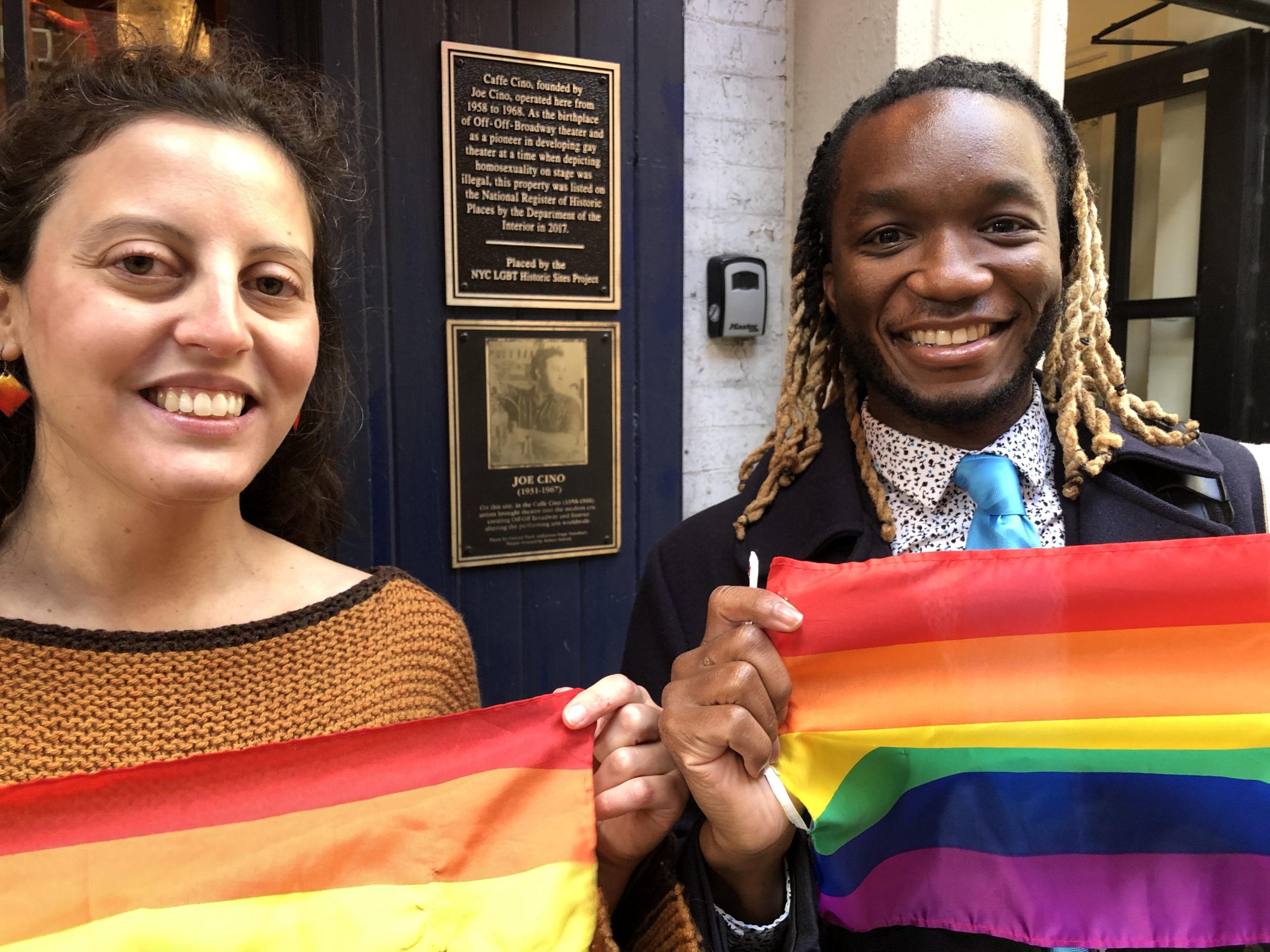
In 2017, we successfully listed the Caffe Cino building to the National Register of Historic Places, in recognition of its significance as the birthplace of Off-Off-Broadway and as a pioneer in the development of gay theater at a time when depicting homosexuality on stage was illegal. The Caffe Cino is one of my favorite sites that I’ve ever researched – a wonderfully quirky, vibrant, and touching story that comes right out of the pages of what Greenwich Village must have been like during the 1960s. For most of the 20th century, this area was very Italian, something that Joe Cino would use to his advantage when he stood here, in December 1958, with his then-boyfriend, Ed, who showed Joe a “for rent” sign on the storefront space at 31 Cornelia Street and introduced him to the landlady, Mrs. Leema, who was looking out her upstairs window. Once they made the connection that she was Italian and Joe was Sicilian, Mrs. Leema said, “I don’t even have to come down, I’ll throw the keys.” And from there, Joe said, in his only known interview, he and Ed “went in and viewed the ruins.” He saw the potential in the tiny room, already envisioning where the counter and coffee machine would go.
The Caffe Cino opened soon after and by 1960, plays were being staged. A year later, playwright Doric Wilson helped establish the Cino as a venue for new work with four plays – two of which included gay themes. The Cino’s breakthrough hit came in 1964 with the staging of Lanford Wilson’s The Madness of Lady Bright, which was centered on an aging drag queen slowly going mad alone in his room. It was so popular that within a year, the Caffe became particularly well known for presenting gay or gay-friendly works. The most successful production here was Dames at Sea, which introduced teenager Bernadette Peters in 1966.
It’s impossible to tell the Cino’s whole story today or even mention the impressive list of theater artists associated with it, but perhaps it’s best summed up by saying that the Cino was a place where Joe Cino encouraged anyone to write about anything they wanted. For gay playwrights, in an era of widespread homophobia, this provided a level of freedom to write gay-themed work at a level never before experience on the New York stage. The Caffe Cino is, as I like to say, a true testament to the arts as a powerful platform for change. In the 1960s, before the Stonewall Uprising and the Gay Liberation era led to increased visibility for LGBT people, gay theater artists at the Cino gave audiences rare public exposure to multi-dimensional and realistic gay characters, and, in doing so, challenged the negative and stereotypical portrayals that had permeated
mainstream theater and film for decades. What we see on stage or on screen very often affects how we view each other and even view ourselves. Although the Cino closed in 1968, following the tragic suicide of Joe Cino a year earlier, the gay theater that it had nurtured continued to evolve with the emergence of gay theater companies, some of which were founded by Cino alums.
We’re honored to be able to unveil the National Register plaque on what would be Joe Cino’s 91 st birthday, and also celebrate the return of the plaque donated by playwright Robert Patrick in 2008.
Pictured, Amanda Davis with Tevin Williams, representing State Sen. Brad Hoylman.
NYC’s Oldest Gay Bar May Soon Get Landmark Status
November 16, 2022
By: Sharon Crowley
from Fox 5
Regulars at Julius Bar in Greenwich Village are eager for the city of New York to designate the tavern as a local historical landmark.
“It’s really important to have the city recognize Julius as a city landmark,” said Ken Lustbader, the co-director of the New York City LGBT Historic Sites Project.
The Stonewall Inn was cemented as the birthplace of the gay rights movement in the U.S. because of the infamous uprising there in 1969. But what many people don’t know is that in 1966 a group of gay men staged an earlier protest trying to get served at the counter.
NYC’s Oldest Gay Bar May Soon Get Landmark Status
November 16, 2022
By: Rana Novini
from NBC News New York
A bar since 1864, Julius’ was thrust into the forefront of the gay rights movement in 1966 — three years before the Stonewall riots — when activists staged a peaceful “sip in,” announcing they are homosexuals and asking to be served
Andrew Dolkart, with the NYC LGBT Historic Sites Project, is one of the people fighting for Julius’ Bar to get a city landmark designation. He said it would formalize the bar’s significance in New York and American history.
“These young men who took part in this event, this was incredibly courageous,” said Dolkart. “We need to know where we’ve been, where we are and where we need to go.”
The city’s Landmarks and Preservation Committee held a public hearing Monday where many spoke about why the Greenwich Village mainstay should be recognized. For now, the bar waits, but Adan is already planning the celebration.
There was no opposition to the proposal at the hearing. For the next step, the commission will schedule a public hearing for a vote.
Plaque Unveiling for Caffe Cino
November 16, 2022 | 2:30 PM
Bombay Bistro (former home of the Caffe Cino)
31 Cornelia Street
View on Google Maps
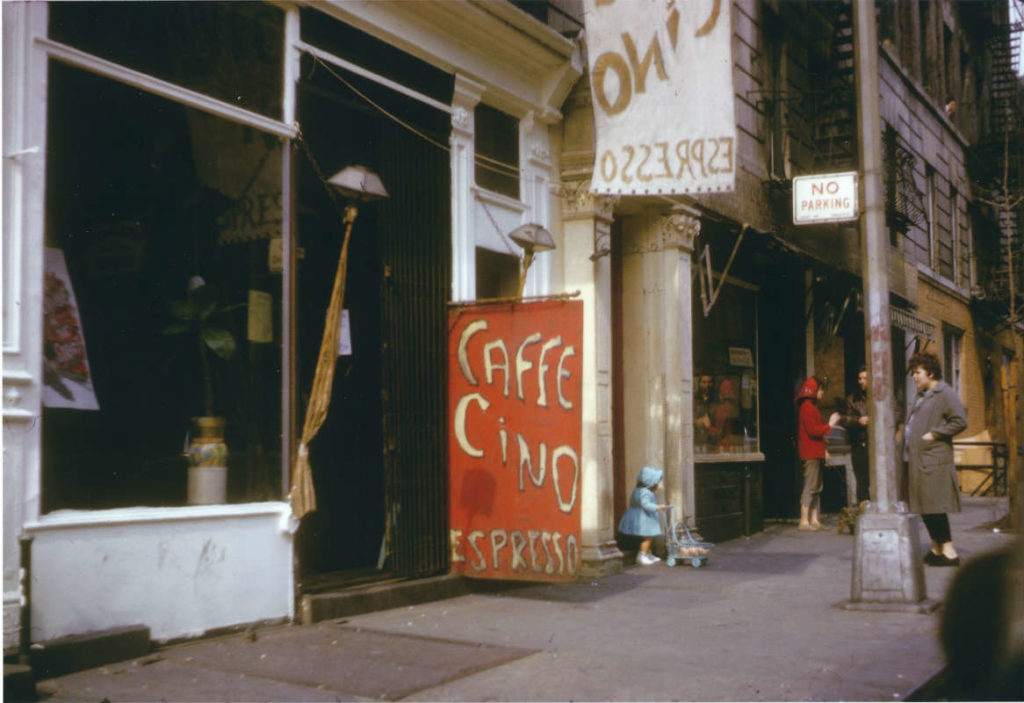
The Caffe Cino operated from 1958 to 1968 and was owned by Joe Cino, an openly gay man. The cafe theater venue is recognized as the birthplace of Off-Off-Broadway and was a pioneer in the development of gay theater, at a time when depicting homosexuality on stage was still illegal. In 2017, the NYC LGBT Historic Sites Project successfully nominated the Caffe Cino space to the National Register of Historic Places for its significance to LGBT history.
We invite you to celebrate the Caffe Cino with us as we unveil a plaque at 31 Cornelia Street in Greenwich Village, its former home, on what would have been Joe Cino’s 91st birthday. The plaque recognizes the Cino’s listing on the National Register. We’ll be joined by Bombay Bistro, the current tenant of the space, Magie Dominic, a Cino alum whose archives were invaluable in writing the National Register nomination, as well as a number of special guests.
You can read more about the Caffe Cino on our project page. We hope to see you there!
Audre Lorde’s New York
November 8, 2022
By: Amanda Davis
Last month, I participated in “A Celebration of Audre Lorde,” a virtual event that was hosted by the College of Staten Island. The evening was full of wonderful remembrances and discussions of Lorde and her work. This year marks a couple of anniversaries related to the self described “Black, lesbian, feminist, mother, poet warrior”: she moved to Staten Island 50 years ago with her family and, after a hard fought battle with breast cancer, she died 30 years ago this November 17th. (October was chosen for the event to coincide with Breast Cancer Awareness Month; it’s also LGBT History Month).
My portion of the evening focused on historic places on our website that connect to Lorde’s legacy. Here’s a little snapshot of Audre Lorde’s New York:
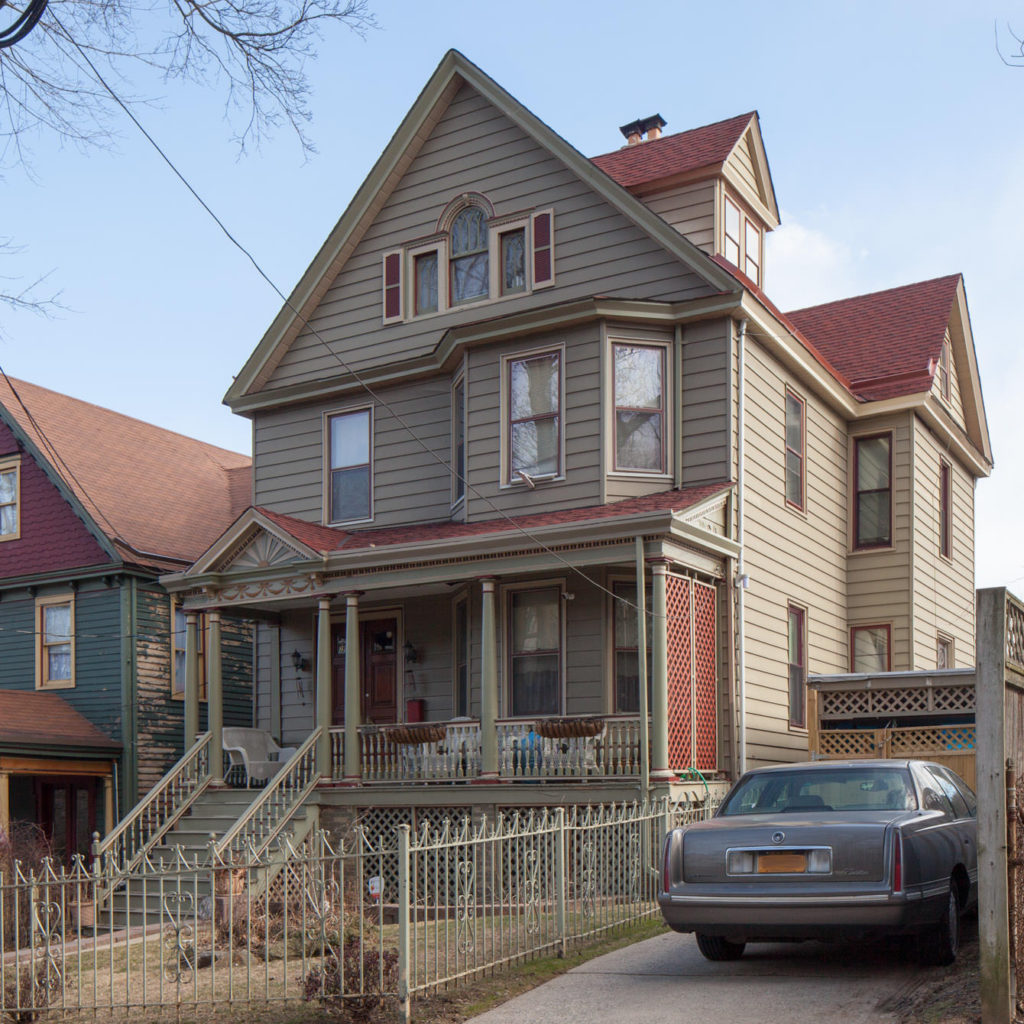
Audre Lorde bought this house at 207 St. Paul’s Avenue in Stapleton Heights in 1972 and lived here with her partner Frances Clayton and two children. The family unfortunately dealt with racism while living here but Lorde also noted that the home’s garden, trees, and proximity to the water were some of the reasons she chose to move to Staten Island. A photo taken by Joan E. Biren (JEB) shows Lorde writing away at her desk in her upstairs study. This is where she wrote some of her most famous work, including (but not limited to) Zami: A New Spelling of My Name (1982). She and her family lived here until 1987. Read more about Lorde’s connection with this house.
One of our Project’s goals is to expand the number of designated LGBT landmarks in New York City. In a meeting with the NYC Landmarks Preservation Commission (LPC), the city agency that designates and regulates the city’s landmarks, we advocated that this house, along with several others, become a New York City Landmark. After a public hearing in June 2019 — where we, of course, testified in support! — LPC commissioners voted to designate the house and five other sites, making Lorde’s home the first LGBT-related New York City Landmark outside Manhattan.
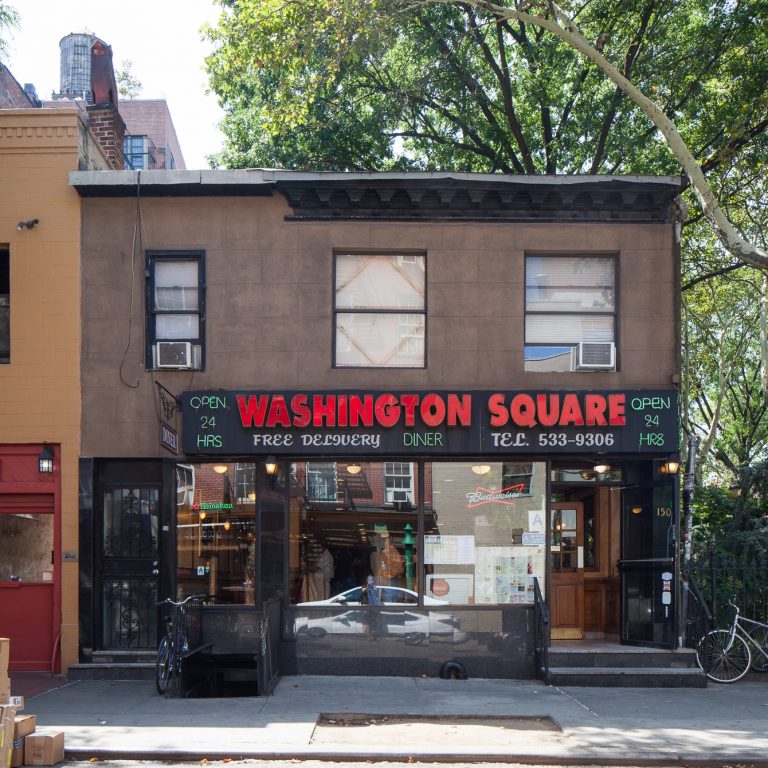
In Zami, Lorde wrote of several lesbian bars in Greenwich Village that she frequented in the 1950s, providing an invaluable account of nightlife in this period for lesbians in general and Black lesbians in particular. Of the Pony Stable Inn at 150 West 4th Street, she noted that “There were always rumors of plainclothes women circulating among us, looking for gay girls with fewer than three pieces of female attire. That was enough to get you arrested for transvestism, which was illegal.”
Bars historically were safe spaces for the LGBT community, but there were also risks involved. We’ve created a curated theme on Bar Raids and Forced Closures that puts this into context.
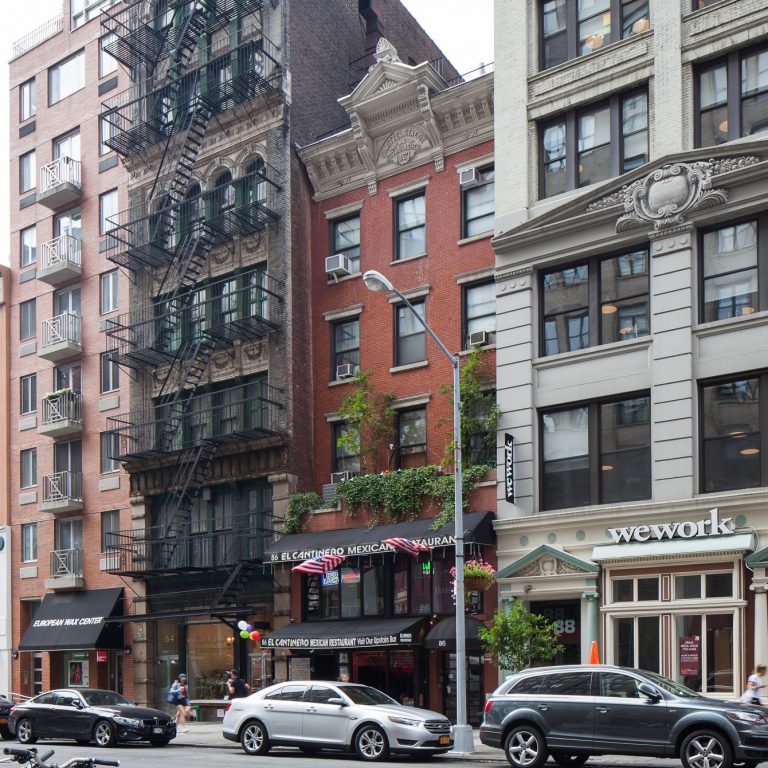
Several lesbian women we’ve spoken to fondly recall The Bagatelle at 86 University Place. Lorde referred to it in Zami as “the most popular gay-girl’s bar in the Village” but, at the same time, many Black lesbians did not feel welcome there. She recalled, “the bouncer was always asking me for my ID to prove that I was twenty-one…Of course ‘you can never tell with Colored people.'”
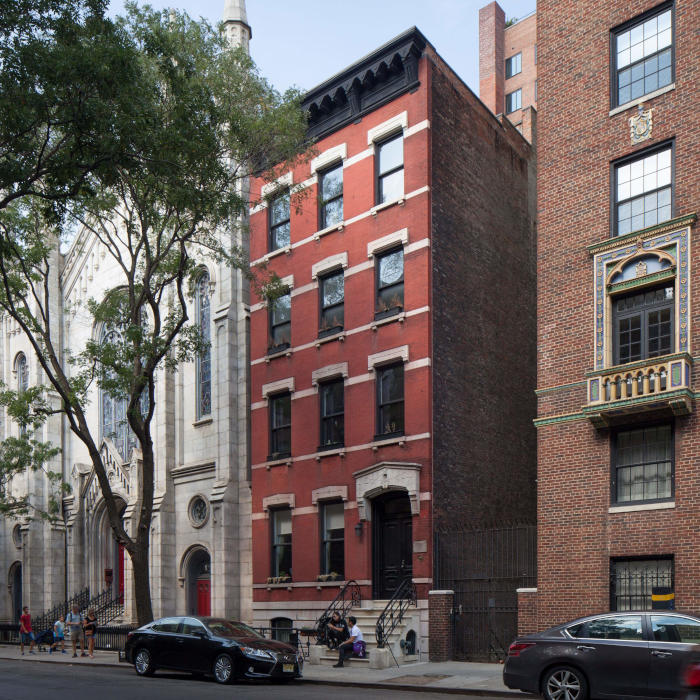
This is what made groups like the Salsa Soul Sisters so important to lesbians of color, providing an alternative to bars where they had historically faced discrimination. Black lesbian luminaries like Audre Lorde were invited to speak on various topics, creating a space that was rare for lesbians of color in 1970s America, according to member Candice Boyce.
The group grew out of the Black Lesbian Caucus of the Gay Activists Alliance, which met at the GAA Firehouse in SoHo in the early 1970s. Salsa Soul’s first regular meeting space was the Metropolitan-Duane United Methodist Church (now Church of the Village) but its longtime home was in the parish house of Washington Square Park United Methodist Church.
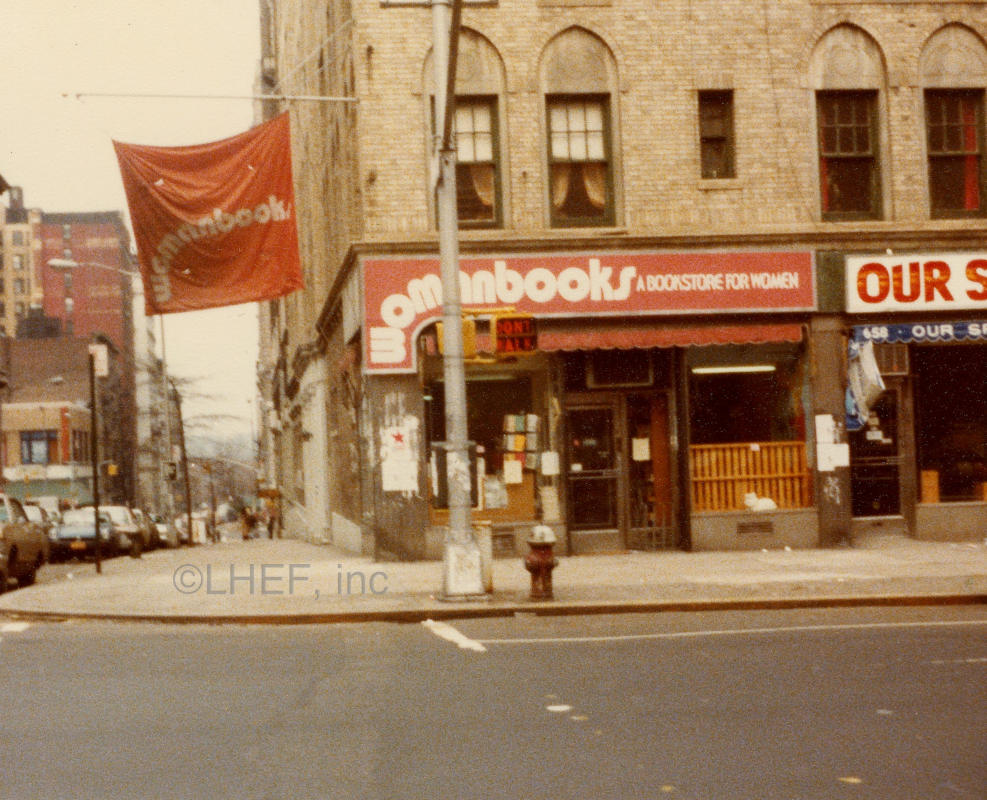
Let’s end with an archival photograph (always my favorite!) of Womanbooks, which was located at 201 West 92nd Street on the Upper West Side from 1975 to 1987. The bookstore doubled as a community center for women regardless of sexuality, race, or political affiliation, and was another one of several places in the city where Audre Lorde spoke to lesbian audiences.
What are some of the other places where she made her mark in the city? Type her name in the search bar at the top of the website or watch the recording of “A Celebration of Audre Lorde” below. Participants include faculty and students of the College of Staten Island, Debbie-Ann Paige of the Staten Island African American Heritage Tour, and Victoria Munro of the Alice Austen House who spoke with Lorde’s sister comrades.
NYC LGBTQ historic sites project receives ‘excellence’ award
November 6, 2022
By: Lou Chibbaro Jr.
from the Washington Blade
The National Trust for Historic Development has chosen the New York City LGBT Historic Sites Project as the recipient of its Trustees Award for Organization Excellence.
The LGBT Historic Sites Project is one of nine historic preservation-related organizations that were recognized with awards at a Nov. 4 virtual ceremony that was available to the public.
“The NYC LGBT Historic Sites Project is a nationally recognized and influential cultural heritage initiative and educational resource that identifies and documents diverse extant LGBT sites from the 17th century to 2000,” the announcement says.
See the full article by the Washington Blade.
Featured thumbnail via Washington Blade file photo by Michael Key.
NYC LGBT Historic Sites Project To Receive Prestigious Trustees’ Award From the National Trust for Historic Preservation
November 4, 2022
By: A.A. Cristi
from Broadway World
The NYC LGBT Historic Sites Project’s work to identify and document NYC’s place-based LGBT history is being honored by the National Trust for Historic Preservation today, Friday, November 4th, at 4PM EST with their Trustees’ Award for Organizational Excellence, one of our field’s highest honors. The award will be given at the PastForward Conference, in a ceremony hosted by old house icon Bob Vila.
NYC LGBT Historic Sites Project honored with award for ‘making a once invisible history visible’
November 5, 2022
By: Muri Assunção
from the New York Daily News
A New York City nonprofit that focuses on documenting sites that are connected to the city’s rich LGBTQ history and culture has been recognized for its “trailblazing approach to making a once invisible story visible.”
The NYC LGBT Historic Sites Project on Friday received the Trustees’ Award for Organizational Excellence from the National Trust for Historic Preservation, a Washington, D.C.-based nonprofit that works in the field of historic preservation in the United States.
The award, which honors “superlative and continued achievement in historic preservation by an organization,” was presented to Ken Lustbader, the organization’s co-founder and co-director.